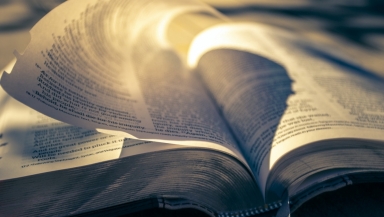
Jewish academic and expert in the Hebrew Bible, Irene Lancaster, reflects on the Old Testament prophet Elijah.
This week's Shabbat Torah portion is called Ki Tissa (Exodus 30:11-34:35) and corresponds to the Haftorah reading taken from the Book of 1 Kings 18: 1-39.
What do these two readings have in common and how are they relevant today?
First of all, they are both always read in the joyful month of Adar. The subject of both readings is idolatry and the dangers idolatry entails. In the end, however, the Jewish people are saved – just.
For the euphoria surrounding Moses' ascension to receive the 613 mitzvot (including the Ten Commandments) on Mount Sinai and the delay in his descent leads to impatience down below and the fashioning by the people of the Golden Calf.
In similar fashion, in the 9<sup>th century BCE Elijah (known in Hebrew as Eliyahu) warns the priests of Ba'al on another mountain, this time Mount Carmel, that they are simply worshipping idols and that idol worship leads to monarchs such as Ahab and Jezebel, who bring death and destruction in their wake. And that no good will come of this kind of idolatrous worship based on superstition.
The story of Eliyahu and the false prophets of Ba'al reminds me very much of my special friendship with the Chief Rabbi of Haifa, Shear Yashuv Cohen and his wife, Naomi, who were instrumental in building up the State of Israel in a variety of ways.
Last week, Naomi contacted me out of the blue on Erev Shabbat to tell me she loved me and not to worry (this second part was most unlike Naomi, for whom worry was an essential and necessary ingredient of life, keeping us on our toes and preventing us from becoming complacent).
The next thing I knew was that Shabbat was over and I had received a message in Hebrew on my smartphone, informing me of Naomi's death and details about her burial on the Mount of Olives, with instructions for the 7-day shiva period to follow.
Rabbanit Dr Naomi Goldstein Cohen and her husband, Haifa's Chief Rabbi, lived near me on Mount Carmel itself and were synonymous with the modern history of Haifa and further afield.
As a baby, Shear Yashuv's first words were 'Eliyahu ha-bibi'', alluding to the refrain, 'Eliyahu the prophet', the first line of a song which is sung after Shabbat has finished, when Jews the world over hope to usher in the Messianic age, with the prophet Eliyahu as the harbinger of this age.
The first time Shear Yashuv had uttered that phrase had been when the great Rav Kook, first Chief Rabbi of Israel during the British Mandate, had been staying with the family on Mount Carmel, the same Mount Carmel where the Prophet Eliyahu had overcome the prophets of Ba'al. This would have been in August 1928, when baby Shear Yashuv was nine months old.
The book of Kings depicts the true prophet as someone who speaks in 'a still small voice'. Like Moses on Mount Sinai, according to 1 Kings 19, Eliyahu 'went 40 days and 40 nights unto Horeb, the mountain of G-d.... And He said: 'Go forth and stand upon the mountain before the Lord.' And behold, the Lord passed by and a great and strong wind rent the mountains, and shattered the rocks before the Lord. But the Lord was not in the wind and after the wind an earthquake. But the Lord was not in the earthquake. And after the earthquake a fire. But the Lord was not in the fire. And after the fire a still small voice.'
The Cohens too lived on Horeb St on Mount Carmel and often experienced, as did the entire neighbourhood, the storms, earthquakes and wild winds that were no foreign occurrence for the residents of Mount Carmel. On one such occasion the Carmel Choir, which I was accompanying on the piano at the very top of Mount Carmel, were rehearsing Mendelssohn's famous Oratorio, 'Elijah', based on the story of this week's Haftorah reading.
We had just finished the trio: 'Lift thine eyes to the mountains' (Psalm 121) and were starting 'He watching over Israel', when the lights went out, the power broke down and a lightening flash came through the window. Naturally, being a pro, I continued to play as if nothing had happened. Hadn't we just been through the 2<sup>nd Lebanon War in Haifa, after all ... what's a lightning flash between friends when the show must go on?
It is hard for us in the 21<sup>st century to believe that these biblical descriptions of thunder, lightning flashes and still small voices are no more than metaphors. Of course they are metaphors. But they are also very real. Living in Haifa is a precarious business, now, as it was then. And the Chief Rabbi, Shear Yashuv, was particularly aware of the special meaning of the name of Eliyahu. For he himself was given this special extra name at the suggestion of the great Rav Kook.
In 1929, aged two, baby Shear Yashuv became very ill, and after prayers led for him by the Chief Rabbi at the Kotel (Western Wall of the Temple in Jerusalem), the latter suggested giving the mortally ill young baby the additional name of Eliyahu. That night, the baby's condition improved, and from that moment on he was known as Eliyahu Yosef Shear Yashuv.
Nearly 50 years after this incident, when Shear Yashuv was chosen to be the next Ashkenazi Chief Rabbi of Haifa together with the Sefardi Chief Rabbi, Rabbi Eliyahu Bakshi Doron, they both recognized with delight their very personal connection with the Prophet Eliyahu 'whose life and work is associated with Mount Carmel and the city of Haifa.'
Shear Yashuv's wife repeated this story to me many times. She was a most marvelous woman, who loved the cut and thrust of argument, debate and engaging people who stood up to her. I loved her dearly, and especially the fact that she wasn't interested in food, clothes, or fine words. What she truly admired was the furtherance of the Jewish people through family, integrity and women's rights.
Like the true prophets of old, Naomi demanded a great deal from her friends, but also gave a great deal in return. Having arrived in the new State aged 19, in 1949, from a leading Orthodox family in New York, she helped to establish a number of enterprises that would assist younger women, and especially new female immigrants, to find their own voices.
But Naomi's voice was itself never ever strident – it was 'the still small voice' she had learned to cultivate on top of the Carmel mountain, home to so many plucky and feisty individuals, but best known for the story of Eliyahu and his struggle with the forces of idolatry, power, might and falsehood.
And so we say, as we fill up every year a special Pesach cup for the same Eliyahu, which we leave overnight for him to drink up when he visits every Jewish household wherever they may be all over the world, 'Next Year in Jerusalem, next year in Jerusalem rebuilt.'
If you want to consider this topic further, my English-language version of the biography of Chief Rabbi Shear Yashuv Cohen of Haifa is published by Urim Press and a recent recording of Rabbanit Dr Naomi Cohen's life is accessible in modern Hebrew here.













